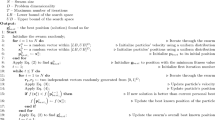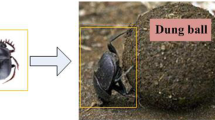Abstract
The particle swarm optimization (PSO) algorithm is a popular evolutionary computation approach that has received an ever-increasing interest in the past decade owing to its wide application potential. Despite the many variants of the PSO algorithm with improved search ability by means of both the convergence rate and the population diversity, the local optima problem remains a major obstacle that hinders the global optima from being found. In this paper, a novel randomized particle swarm optimizer (RPSO) is proposed where the Gaussian white noise with adjustable intensity is utilized to randomly perturb the acceleration coefficients in order for the problem space to be explored more thoroughly. With this new strategy, the RPSO algorithm not only maintains the population diversity but also enhances the possibility of escaping the local optima trap. Experimental results demonstrate that the proposed RPSO algorithm outperforms some existing popular variants of PSO algorithms on a series of widely used optimization benchmark functions.









Similar content being viewed by others
References
Blackwell T, Kennedy J (2018) Impact of communication topology in particle swarm optimization. IEEE Trans Evol Comput 23(4):689–702
Cao J, Bu Z, Gao G, Tao H (2016) Weighted modularity optimization for crisp and fuzzy community detection in large-scale networks. Phys A 462:386–395
Cao J, Bu Z, Wang Y, Yang H, Jiang J, Li H-J (2019) Detecting prosumer-community group in smart grids from the multiagent perspective. IEEE Trans Syst Man Cybern Syst 49(8):1652–1664
Chen W-N, Zhang J, Lin Y, Chen N, Zhan Z-H, Chung HS-H, Li Y, Shi Y-H (2013) Particle swarm optimization with an aging leader and challengers. IEEE Trans Evol Comput 17(2):241–258
Chen Y, Wang Z, Wang L, Sheng W (2019) Mixed \(H_{2}/H_{\infty }\) state estimation for discrete-time switched complex networks with random coupling strengths through redundant channels. In: IEEE transactions on neural networks and learning systems (in press). https://doi.org/10.1109/TNNLS.2019.2952249
Chen Y, Wang Z, Wang L, Sheng W (2020) Finite-horizon \(H_{\infty }\) state estimation for stochastic coupled networks with random inner couplings using Round–Robin protocol. IEEE Trans Cybern (in press). https://doi.org/10.1109/TCYB.2020.3004288.
Cheng R, Jin Y (2015) A competitive swarm optimizer for large scale optimization. IEEE Trans Cybern 45(2):191–204
Clerc M, Kennedy J (2002) The particle swarm: explosion, stability, and convergence in a multi-dimensional complex space. IEEE Trans Evol Comput 6(1):58–73
Cui L, Li G, Lin Q, Chen J, Lu N (2016) Adaptive differential evolution algorithm with novel mutation strategies in multiple sub-populations. Comput Oper Res 67:155–173
Del Valle Y, Venayagamoorthy GK, Mohagheghi S, Hernandez J-C, Harley RG (2008) Particle swarm optimization: basic concepts, variants and applications in power systems. IEEE Trans Evol Comput 12(2):171–195
Eberhart RC, Kennedy J (1995) A new optimizer using particle swarm theory. In: Proceedings of the 6th international symposium on micro machine and human science, Nagoya, Japan, pp 39–43
Eberhart RC, Shi YH (2000) Comparing inertia weights and constriction factors in particle swarm optimization. In: Proceedings of the 2000 congress on evolutionary computation, San Diego, USA, pp 84–88
Eberhart RC, Shi YH (2001) Particle swarm optimization: developments, applications and resources. In: Proceedings of the 2001 congress on evolutionary computation, Seoul, South Korea, vol 1, pp 81–86
Garg H (2016) A hybrid PSO-GA algorithm for constrained optimization problems. Appl Math Comput 274:292–305
Garcia-Villoria A, Pastor R (2009) Introducing dynamic diversity into a discrete particle swarm optimization. Comput Oper Res 36(3):951–966
Hu M, Wu T, Weir JD (2013) An adaptive particle swarm optimization with multiple adaptive methods. IEEE Trans Evol Comput 17(5):705–720
Kennedy J, Eberhart RC (1995) Particle swarm optimization. In: Proceedings of the 1995 IEEE international conference on neural networks, Perth, Australia, pp 1942–1948
Lehre PK, Witt C (2011) Finite first hitting time versus stochastic convergence in particle swarm optimisation. arXiv:1105.5540
Liang JJ, Qin AK, Suganthan PN, Baskar S (2006) Comprehensive learning particle swarm optimizer for global optimization of multimodal functions. IEEE Trans Evol Comput 10(3):281–295
Liang JJ, Qu BY, Suganthan PN, Chen Q (2014) Problem definitions and evaluation criteria for the CEC 2015 competition on learning-based real-parameter single objective optimization. Technical Report, Zhengzhou University and Nanyang Technological University
Liu Y, Cheng Q, Gan Y, Wang Y, Li Z, Zhao J (2019) Multi-objective optimization of energy consumption in crude oil pipeline transportation system operation based on exergy loss analysis. Neurocomputing 332:100–110
Liu Y, Chen S, Guan B, Xu P (2019) Layout optimization of large-scale oil–gas gathering system based on combined optimization strategy. Neurocomputing 332:159–183
Ma L, Li J, Lin Q, Gong M, Coello CAC, Ming Z (2018) Reliable link inference for network data with community structures. IEEE Trans Cybern 49(9):3347–3361
Ma Q, Li J, Lin Q, Gong M, Coello CAC, Ming Z (2019) Cost-aware robust control of signed networks by using a memetic algorithm. IEEE Trans Cybern. https://doi.org/10.1109/TCYB.2019.2932996
Motwani R, Raghavan P (1995) Randomized algorithms. Cambridge University Press, New York
Pan X, Xue L, Lu Y, Sun N (2019) Hybrid particle swarm optimization with simulated annealing. Multimed Tools Appl 78(21):29921–29936
Rahman IU, Wang Z, Liu W, Ye B, Zakarya M, Liu X (2020) An n-state Markovian jumping particle swarm optimization algorithm. IEEE Trans Syst Man Cybern Syst. https://doi.org/10.1109/TSMC.2019.2958550
Ratnaweera A, Halgamuge SK, Watson HC (2004) Self-organizing hierarchical particle swarm optimizer with time-varying acceleration coefficients. IEEE Trans Evol Comput 8(3):240–255
Schmitt M, Wanka R (2015) Particle swarm optimization almost surely finds local optima. Theoret Comput Sci 561:57–72
Shi YH, Eberhart RC (1998) Parameter selection in particle swarm optimization. In: Proceedings of the 7th international conference on evolutionary programming, San Diego, USA, pp 591–600
Shi YH, Eberhart RC (1999) Empirical study of particle swarm optimization. In: Proceedings of the 1999 IEEE congress on evolutionary computation, Washington DC, USA, pp 1945–1950
Song B, Wang Z, Zou L (2017) On global smooth path planning for mobile robots using a novel multimodal delayed PSO algorithm. Cognit Comput 9(1):5–17
Song B, Wang Z, Zou L, Xu L, Alsaadi FE (2019) A new approach to smooth global path planning of mobile robots with kinematic constraints. Int J Mach Learn Cybernet 10(1):107–119
Taherkhani M, Safabakhsh R (2016) A novel stability-based adaptive inertia weight for particle swarm optimization. Appl Soft Comput 38:281–295
Tang Y, Wang Z, Fang J (2011) Parameters identification of unknown delayed genetic regulatory networks by a switching particle swarm optimization algorithm. Expert Syst Appl 38:2523–2535
Van der Merwe DW, Engelbrecht AP (2003) Data clustering using particle swarm optimization. In: Proceedings of the 2003 IEEE congress on evolutionary computation, Canberra, Australia, vol 1, pp 215–220
Wang L, Wang Z, Han Q-L, Wei G (2018) Event-based variance-constrained \({\cal{H}}_{\infty }\) filtering for stochastic parameter systems over sensor networks with successive missing measurements. IEEE Trans Cybern 48(3):1007–1017
Wang L, Wang Z, Wei G, Alsaadi FE (2018) Finite-time state estimation for recurrent delayed neural networks with component-based event-triggering protocol. IEEE Trans Neural Netw Learn Syst 29(4):1046–1057
Xiao X, Mei C, Liu G (2010) Improved particle swarm optimization algorithm based on random perturbations. In: Proceedings of the 2010 third international joint conference on computational science and optimization, Huangshan, China, pp 404–408
Yao X, Liu Y, Lin G (1999) Evolutionary programming made faster. IEEE Trans Evol Comput 3(2):82–102
Zeng N, Zhang H, Chen Y, Chen B, Liu Y (2016) Path planning for intelligent robot based on switching local evolutionary PSO algorithm. Assembly Autom 36(2):120–126
Zeng N, Wang Z, Zhang H, Alsaadi FE (2016) A novel switching delayed PSO algorithm for estimating unknown parameters of lateral flow immunoassay. Cognit Comput 8(2):143–152
Zeng N, Qiu H, Wang Z, Liu W, Zhang H, Li Y (2018) A new switching-delayed-PSO-based optimized SVM algorithm for diagnosis of Alzheimer’s disease. Neurocomputing 320:195–202
Zhan Z-H, Zhang J, Li Y, Chung HS-H (2009) Adaptive particle swarm optimization. IEEE Trans Syst Man Cybern Part B Cybern 39(6):1362–1381
Zhan Z-H, Zhang J, Li Y, Shi Y-H (2011) Orthogonal learning particle swarm optimization. IEEE Trans Evol Comput 15(6):832–847
Zou L, Wang Z, Gao H, Liu X (2017) State estimation for discrete-time dynamical networks with time-varying delays and stochastic disturbances under Round-Robin protocol. IEEE Trans Neural Netw Learn Syst 28(5):1139–1151
Zou L, Wang Z, Han Q-L, Zhou DH (2019) Moving horizon estimation of networked nonlinear systems with random access protocol. IEEE Trans Syst Man Cybern Syst (in press). https://doi.org/10.1109/TSMC.2019.2918002
Zou L, Wang Z, Han Q-L, Zhou DH (2019) Full information estimation for time-varying systems subject to Round-Robin scheduling: a recursive filter approach. IEEE Trans Syst Man Cybern Syst (in press). https://doi.org/10.1109/TSMC.2019.2907620
Acknowledgements
This work was supported in part by the European Union’s Horizon 2020 Research and Innovation Programme under Grant 820776 (INTEGRADDE), the UK-China Industry Academia Partnership Programme under Grant UK-CIAPP-276, the National Natural Science Foundation of China under Grants 61873148 and 61933007, the Royal Society of the UK, and the Alexander von Humboldt Foundation of Germany.
Author information
Authors and Affiliations
Corresponding author
Additional information
Publisher's Note
Springer Nature remains neutral with regard to jurisdictional claims in published maps and institutional affiliations.
Rights and permissions
About this article
Cite this article
Liu, W., Wang, Z., Zeng, N. et al. A novel randomised particle swarm optimizer. Int. J. Mach. Learn. & Cyber. 12, 529–540 (2021). https://doi.org/10.1007/s13042-020-01186-4
Received:
Accepted:
Published:
Issue Date:
DOI: https://doi.org/10.1007/s13042-020-01186-4




